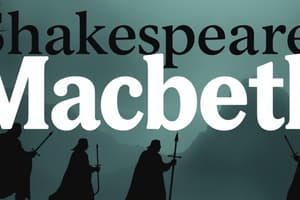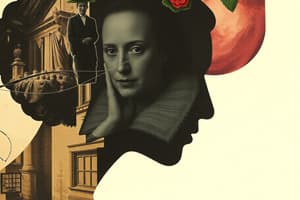Podcast
Questions and Answers
What does Macbeth mean by referring to 'borrow'd robes'?
What does Macbeth mean by referring to 'borrow'd robes'?
- He feels noble for receiving a title.
- He intends to keep the title for a long time.
- He believes power is temporary. (correct)
- He is confused about his identity.
Banquo believes that Macbeth's ambition is solely a positive trait.
Banquo believes that Macbeth's ambition is solely a positive trait.
False (B)
What does the phrase 'an honest trifle' suggest about Macbeth's title as thane of Cawdor?
What does the phrase 'an honest trifle' suggest about Macbeth's title as thane of Cawdor?
It suggests that the title is insignificant and could be easily lost.
Macbeth's blood lust is a result of the __________ society in which he lives.
Macbeth's blood lust is a result of the __________ society in which he lives.
Match the characters with their traits or actions:
Match the characters with their traits or actions:
What does Macbeth imply by saying, 'If chance will have me king, why, chance may crown me, without my stir'?
What does Macbeth imply by saying, 'If chance will have me king, why, chance may crown me, without my stir'?
Macbeth treats Lady Macbeth as inferior in their relationship.
Macbeth treats Lady Macbeth as inferior in their relationship.
What does Macbeth mean when he refers to 'bloody murder' in relation to seizing his opportunity?
What does Macbeth mean when he refers to 'bloody murder' in relation to seizing his opportunity?
Macbeth's _____ heart reflects his inner turmoil and desire for action.
Macbeth's _____ heart reflects his inner turmoil and desire for action.
Match the following elements with their significance in Macbeth's journey:
Match the following elements with their significance in Macbeth's journey:
What is suggested by the First Witch's reference to the pilot's thumb?
What is suggested by the First Witch's reference to the pilot's thumb?
Banquo tries to convince Macbeth not to kill Duncan.
Banquo tries to convince Macbeth not to kill Duncan.
What common link do the witches and Macbeth share?
What common link do the witches and Macbeth share?
The witches refer to Macbeth as 'thou' to indicate a sense of ________.
The witches refer to Macbeth as 'thou' to indicate a sense of ________.
Match the characters with their roles regarding Macbeth's fate:
Match the characters with their roles regarding Macbeth's fate:
What does Banquo's use of 'you' signify in his conversation with Macbeth?
What does Banquo's use of 'you' signify in his conversation with Macbeth?
Macbeth immediately plans to kill Duncan after hearing the witches' prophecy.
Macbeth immediately plans to kill Duncan after hearing the witches' prophecy.
What does Banquo reveal about his own character in relation to Macbeth's ambition?
What does Banquo reveal about his own character in relation to Macbeth's ambition?
What is considered the most sinful act in relation to hospitality in Greek mythology?
What is considered the most sinful act in relation to hospitality in Greek mythology?
Macbeth sees ambition as a sufficient motivator to kill Duncan.
Macbeth sees ambition as a sufficient motivator to kill Duncan.
What does Macbeth compare God to in his accusations?
What does Macbeth compare God to in his accusations?
Lady Macbeth urges the spirits to 'unsex me here', indicating her desire to become more _______ to gain power.
Lady Macbeth urges the spirits to 'unsex me here', indicating her desire to become more _______ to gain power.
Match the character with their corresponding themes or actions:
Match the character with their corresponding themes or actions:
Which character is primarily associated with the theme of hamartia?
Which character is primarily associated with the theme of hamartia?
Macbeth accuses God of having lost sight of his moral purpose.
Macbeth accuses God of having lost sight of his moral purpose.
What tragic realization does Macbeth have about his ambition?
What tragic realization does Macbeth have about his ambition?
What term does Lady Macbeth use to reduce Macbeth's status?
What term does Lady Macbeth use to reduce Macbeth's status?
Lady Macbeth expresses a desire to murder her own child as a way to prove her strength.
Lady Macbeth expresses a desire to murder her own child as a way to prove her strength.
What violent image does Lady Macbeth use to convince Macbeth to kill Duncan?
What violent image does Lady Macbeth use to convince Macbeth to kill Duncan?
Lady Macbeth calls Macbeth her '__________ partner in greatness.'
Lady Macbeth calls Macbeth her '__________ partner in greatness.'
Match the characters with their respective statements:
Match the characters with their respective statements:
What does the emphasis on 'fail' signify in Lady Macbeth's dialogue?
What does the emphasis on 'fail' signify in Lady Macbeth's dialogue?
Macbeth is excited to commit the murder without any doubts.
Macbeth is excited to commit the murder without any doubts.
What visual cue symbolizes Macbeth’s bloodlust when preparing to kill Duncan?
What visual cue symbolizes Macbeth’s bloodlust when preparing to kill Duncan?
What image does Lady Macbeth use to feminize Macbeth?
What image does Lady Macbeth use to feminize Macbeth?
Macbeth expresses his desire to become king without any manipulation from Lady Macbeth.
Macbeth expresses his desire to become king without any manipulation from Lady Macbeth.
What status does Lady Macbeth seek to escape by marrying a powerful man?
What status does Lady Macbeth seek to escape by marrying a powerful man?
Lady Macbeth refers to Macbeth as 'too full of the ______ of human kindness'.
Lady Macbeth refers to Macbeth as 'too full of the ______ of human kindness'.
Match the following quotes with their significance:
Match the following quotes with their significance:
What does the use of 'thou' and 'thee' signify in Lady Macbeth's manipulation?
What does the use of 'thou' and 'thee' signify in Lady Macbeth's manipulation?
What does Lady Macbeth believe ambition can replace in her life?
What does Lady Macbeth believe ambition can replace in her life?
Lady Macbeth believes that becoming queen would provide her with freedom.
Lady Macbeth believes that becoming queen would provide her with freedom.
Flashcards
Soliloquy
Soliloquy
A character's private thoughts spoken aloud, often revealing their true feelings and motivations.
Breaking Hospitality
Breaking Hospitality
The sin of harming a guest or abusing hospitality, considered one of the most serious offenses in ancient Greek mythology and Christianity.
Hamartia
Hamartia
The tragic flaw or weakness in a character's personality that leads to their downfall. It's often a combination of conflicting desires and a lack of self-awareness.
Macbeth's Insecurity
Macbeth's Insecurity
Signup and view all the flashcards
"Borrowed Robes"
"Borrowed Robes"
Signup and view all the flashcards
What is an aside?
What is an aside?
Signup and view all the flashcards
Macbeth's Internal Conflict
Macbeth's Internal Conflict
Signup and view all the flashcards
Banquo's Manipulation
Banquo's Manipulation
Signup and view all the flashcards
Macbeth's Initial Hesitation
Macbeth's Initial Hesitation
Signup and view all the flashcards
Lady Macbeth's Manipulation
Lady Macbeth's Manipulation
Signup and view all the flashcards
Macbeth's Letter to Lady Macbeth
Macbeth's Letter to Lady Macbeth
Signup and view all the flashcards
Pilot's Thumb
Pilot's Thumb
Signup and view all the flashcards
Macbeth's Treatment of Lady Macbeth
Macbeth's Treatment of Lady Macbeth
Signup and view all the flashcards
Manipulating Macbeth
Manipulating Macbeth
Signup and view all the flashcards
Macbeth's Deliberate Planning
Macbeth's Deliberate Planning
Signup and view all the flashcards
Thou vs. You
Thou vs. You
Signup and view all the flashcards
Respecting Banquo
Respecting Banquo
Signup and view all the flashcards
Banquo's Observation
Banquo's Observation
Signup and view all the flashcards
Macbeth's Decision
Macbeth's Decision
Signup and view all the flashcards
Sibilance
Sibilance
Signup and view all the flashcards
Banquo's Influence
Banquo's Influence
Signup and view all the flashcards
Milk of Human Kindness
Milk of Human Kindness
Signup and view all the flashcards
Manipulation in the Letter
Manipulation in the Letter
Signup and view all the flashcards
Feminising Macbeth
Feminising Macbeth
Signup and view all the flashcards
Innocent Flower, Serpent Underneath
Innocent Flower, Serpent Underneath
Signup and view all the flashcards
Lady Macbeth's Insight
Lady Macbeth's Insight
Signup and view all the flashcards
Is Ambition Enough?
Is Ambition Enough?
Signup and view all the flashcards
Lady Macbeth's manipulation of Macbeth: questioning his masculinity
Lady Macbeth's manipulation of Macbeth: questioning his masculinity
Signup and view all the flashcards
Lady Macbeth's use of a violent image to appeal to Macbeth's emotions
Lady Macbeth's use of a violent image to appeal to Macbeth's emotions
Signup and view all the flashcards
Visualizing Macbeth's bloodlust on stage: a crucial detail
Visualizing Macbeth's bloodlust on stage: a crucial detail
Signup and view all the flashcards
The significance of "we" in Lady Macbeth's dialogue
The significance of "we" in Lady Macbeth's dialogue
Signup and view all the flashcards
The foreshadowing of failure in "If we should fail?"
The foreshadowing of failure in "If we should fail?"
Signup and view all the flashcards
The significance of the word "perform" in Lady Macbeth's dialogue
The significance of the word "perform" in Lady Macbeth's dialogue
Signup and view all the flashcards
Lady Macbeth's plan and Macbeth's bloodlust
Lady Macbeth's plan and Macbeth's bloodlust
Signup and view all the flashcards
Shakespeare's critique of the martial society
Shakespeare's critique of the martial society
Signup and view all the flashcards
Study Notes
Act 1, Scene 3
- The witches' influence on Macbeth's decision to kill Duncan is the key question
- A pilot's thumb, lost on his way home from battle, foreshadows Macbeth's tragic fate
- The witches manipulate Macbeth by suggesting he will be king, exploiting his ambition
- Banquo questions the witches' power, suggesting a different perspective on fate
- Banquo and Macbeth's contrasting approaches highlight the different interpretations of the witches' prophecies
Meeting Macbeth
- The witches proclaim Macbeth as future king
- Banquo, expressing respect, recognizes the status difference between him and Macbeth
- The witches' use of "thou" and "you" emphasizes the status inequality between them
- Macbeth's immediate assumption he is destined to be king reveals his ambition and hamartia (fatal flaw)
Banquo's Role
- Banquo's concern for Macbeth's well-being and his own future hints at his integrity and resistance to temptation
- Banquo maintains his respect for Macbeth, highlighting their contrasting perspectives on the witches' prophecies
Act 1, Scene 4
- Macbeth receives a letter from his wife, detailing the witches' prophecies and their impact
- The letter emphasizes Lady Macbeth's ambition for greatness
- Lady Macbeth feels a kinship with Macbeth and her husband as equals in power, suggesting male/female equality
- Lady Macbeth's proactive role in driving Macbeth towards regicide demonstrates her determination to achieve power
Act 1, Scene 7
- Macbeth grapples with the moral implications of killing Duncan
- He ponders the idea of regicide, contrasting the risks with ambition.
- Macbeth questions if ambition is the driving force for his actions
- He acknowledges the hospitality that needs to be observed
- The powerful soliloquy demonstrates his struggles and his fatal flaw
Lady Macbeth's Influence
- Lady Macbeth encourages Macbeth to act decisively on the witches' prophecies, challenging his perceived moral code
- She uses powerful imagery and rhetoric to convince Macbeth of the need for action
- Lady Macbeth appeals to Macbeth's desire to achieve power and to fulfill his ambition
- Shakespeare portrays Lady Macbeth as a force of ambition, manipulating Macbeth while contrasting his masculinity with her power and ambition
- Her feminizing Macbeth further highlights the patriarchal society of the time, juxtaposing masculinity with power
Studying That Suits You
Use AI to generate personalized quizzes and flashcards to suit your learning preferences.




